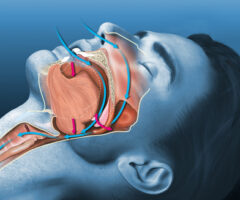Demystifying Sleep Apnea: Causes, Symptoms, and Treatment Options
 Sleep apnea is a common yet often misunderstood sleep disorder that affects millions of people worldwide. It occurs when a person’s breathing is repeatedly interrupted during sleep. In this blog post, we will take a closer look at the causes, symptoms, and treatment options available for sleep apnea.
Sleep apnea is a common yet often misunderstood sleep disorder that affects millions of people worldwide. It occurs when a person’s breathing is repeatedly interrupted during sleep. In this blog post, we will take a closer look at the causes, symptoms, and treatment options available for sleep apnea.
Causes of Sleep Apnea
1. Obstructive Sleep Apnea (OSA): This is the most common form of sleep apnea and occurs when the muscles in the throat relax and obstruct the airway during sleep.
2. Central Sleep Apnea (CSA): This type of sleep apnea is less common and happens when the brain fails to send the proper signals to the muscles controlling breathing.
3. Complex Sleep Apnea Syndrome (CSAS): Also known as treatment-emergent central sleep apnea, this condition is a combination of both obstructive and central sleep apnea.
Symptoms of Sleep Apnea
1. Loud snoring: One of the most recognizable symptoms of sleep apnea is loud, frequent snoring. The snoring is often interrupted by pauses in breathing or choking sounds.
2. Excessive daytime sleepiness: People with sleep apnea often feel excessively sleepy or fatigued during the day, even after a full night’s sleep.
3. Morning headaches: Waking up with a headache is another common symptom of sleep apnea, as it can cause oxygen levels to drop and affect brain function.
4. Waking up frequently: Sleep apnea disrupts the normal sleep pattern, causing individuals to wake up frequently throughout the night.
5. Mood changes and irritability: Lack of quality sleep can lead to mood swings, irritability, and difficulty in concentrating.
Treatment Options for Sleep Apnea
1. Continuous Positive Airway Pressure (CPAP) Therapy: CPAP is the most common and effective treatment for sleep apnea. It involves wearing a mask that delivers a constant flow of air pressure to keep the airway open during sleep.
2. Oral Appliances: These devices are custom-made to fit in the mouth like a sports mouthguard or an orthodontic retainer. They help keep the airway open by repositioning the tongue and jaw.
3. Lifestyle Changes: Certain lifestyle modifications can help alleviate the symptoms of sleep apnea. Losing weight, quitting smoking, avoiding alcohol and sedatives before bedtime, and sleeping on your side rather than your back can all contribute to better sleep quality.
4. Surgery: In severe cases of sleep apnea, surgery may be recommended. Various surgical options can help to remove obstructions or correct abnormalities in the airway.
5. Positional Therapy: Some individuals experience sleep apnea symptoms only when sleeping in certain positions, such as on their back. Using positional therapy devices can help prevent sleep apnea by encouraging sleep in positions that keep the airway open.
Conclusion
Sleep apnea is a serious condition that can significantly impact overall health and quality of life if left untreated. Knowing the causes, recognizing the symptoms, and exploring the available treatment options is crucial in managing sleep apnea effectively. If you suspect that you or a loved one may have sleep apnea, it is important to consult with a healthcare professional for proper diagnosis and guidance towards finding the most appropriate treatment plan. Remember, a good night’s sleep is essential for optimal health and well-being.


